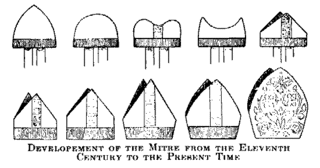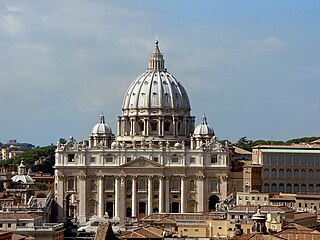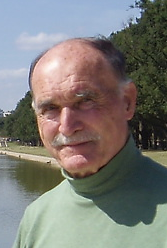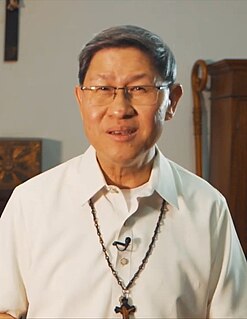Related Research Articles

An episcopal polity is a hierarchical form of church governance in which the chief local authorities are called bishops. It is the structure used by many of the major Christian Churches and denominations, such as the Catholic, Eastern Orthodox, Oriental Orthodox, Church of the East, Anglican, and Lutheran churches or denominations, and other churches founded independently from these lineages.

The Second Ecumenical Council of the Vatican, commonly known as the Second Vatican Council, or Vatican II, was the 21st ecumenical council of the Roman Catholic Church. The council met in St. Peter's Basilica in Rome for four periods, each lasting between 8 and 12 weeks, in the autumn of each of the four years 1962 to 1965. Preparation for the council took three years, from the summer of 1959 to the summer of 1962. The council was opened on 11 October 1962 by John XXIII, and was closed on 8 December 1965 by Paul VI.

Traditionalist Catholicism is a Catholic religious movement characterized by a set of religious beliefs and practices comprising customs, traditions, liturgical forms, public and private, individual and collective devotions, and presentations of Catholic Church teachings that preceded the Second Vatican Council (1962–1965). It is associated in particular with attachment to the 1570–1970 form of the Roman Rite Mass, which traditionalist Catholics call "the Latin Mass", "the traditional Mass", "the ancient Mass", "the immemorial Latin Mass", "the Mass of All Time", "the Mass of the ages" or "the Mass of the Apostles", "the Traditional Latin Mass", or "the Extraordinary Form of the Roman Rite".
Conciliarism was a reform movement in the 14th-, 15th- and 16th-century Catholic Church which held that supreme authority in the Church resided with an Ecumenical council, apart from, or even against, the pope. The movement emerged in response to the Western Schism between rival popes in Rome and Avignon. The schism inspired the summoning of the Council of Pisa (1409), which failed to end the schism, and the Council of Constance (1414–1418), which succeeded and proclaimed its own superiority over the Pope. Conciliarism reached its apex with the Council of Basel (1431–1449), which ultimately fell apart. The eventual victor in the conflict was the institution of the Papacy, confirmed by the condemnation of conciliarism at the Fifth Lateran Council, 1512–17. The final gesture, the doctrine of Papal Infallibility, was not promulgated until the First Vatican Council of 1870.

In a historical perspective, Catholic Modernism is neither a system, school, or doctrine, but refers to a number of individual attempts to reconcile Catholicism with modern culture; specifically an understanding of the Bible and Catholic tradition in light of the historical-critical method and new philosophical and political developments of the late 19th and early 20th centuries—and implicitly all that this might entail.

The theology of Pope Benedict XVI, as promulgated during his pontificate, consists mainly of three encyclical letters on love (2005), hope (2007), and "charity in truth" (2009), as well as apostolic documents and various speeches and interviews. Benedict's theology underwent developments over the years, many of which were characterized by his leadership position in the Congregation for the Doctrine of the Faith, which is entrusted with preserving the Catholic faith in its entirety.
Subsistit in is a Latin phrase which appears in Lumen gentium, the fundamental document on the church from the Second Vatican Council of the Catholic Church. Since the Council the reason for use of the term "subsists in" rather than simply “is” has been disputed. Generally, those who see little or no change in church teaching in Vatican II insist on the equivalence of subsistit in and “is”. Those who point to a new, ecumenical thrust in Vatican II insist that the term was introduced as a compromise after much discussion, and acknowledges new elements in the Council's teaching.

Nouvelle théologie is a school of thought in Catholic theology that arose in the mid-20th century, most notably among certain circles of French and German theologians. The shared objective of these theologians was a fundamental reform of the dominance of Catholic theology by neo-scholasticism, which had resulted in the dominance of teaching by scholastically influenced manuals, criticism of modernism by the Church and a defensive stance towards non-Catholic faiths. The influence of the movement was important as a counterpoint to the widespread neo-scholasticism of Catholic thought, especially through its influence on the reforms initiated at the Second Vatican Council.
Post Vatican II history of the Catholic Church includes the recent history of the Catholic Church since the Second Vatican Council (1962-1965).
Alberto Melloni is an Italian church historian and a Unesco Chairholder of the Chair on Religious Pluralism & Peace, primarily known for his work on the Councils and the Second Vatican Council. Since 2020, he is one of the European Commission's Chief Scientific Advisors.
By the spirit of Vatican II is meant the teaching and intentions of the Second Vatican Council interpreted in a way that is not limited to a literal reading of its documents, or even interpreted in a way that contradicts the "letter" of the Council. This has led to a great diversity of understanding of the phrase.
For a number of years after the controversial 1988 consecrations, there was little if any dialogue between the Society of St. Pius X and the Holy See. This state of affairs ended when the Society led a large pilgrimage to Rome for the Jubilee in the year 2000.

Brian Tierney was a historian and a medievalist. He was educated at Pembroke College, Cambridge. He was a member of the faculty of the Catholic University of America for eight years until becoming professor of medieval history at Cornell University in 1959, becoming the Goldwin Smith Professor of Medieval History in 1969 and the first Bowmar Professor of Humanistic Studies in 1977.

Gerhard Ludwig Müller is a German cardinal of the Catholic Church. He served as the Prefect of the Congregation for the Doctrine of the Faith (CDF) from his appointment by Pope Benedict XVI in 2012 until 2017. He was elevated to the rank of cardinal in 2014.
Roberto de Mattei is an Italian Roman Catholic historian and author.

Luis Antonio Gokim Tagle is a Filipino prelate (cardinal) of the Catholic Church who has been the Prefect of the Congregation for the Evangelization of Peoples since December 8, 2019. He was the 32nd Archbishop of Manila from 2011 to 2019. Tagle also serves as the president of Caritas International, a federation of Catholic relief, development, and social service organizations, and of the Catholic Biblical Federation.
In the Roman Catholic Church, collegiality refers to "the Pope governing the Church in collaboration with the bishops of the local Churches, respecting their proper autonomy." In the early church the popes exercised moral authority rather than administrative power, and that authority was relatively limited; regional churches elected their own bishops, resolved disputes in local synods, and only felt the need to appeal to the Pope under special circumstances.
Giuseppe Alberigo was an Italian historian and editor of a history of the Second Vatican Council that pointed out the discontinuities of the Council and departures from previous Church teaching.
Traditionis custodes is an apostolic letter issued motu proprio by Pope Francis, promulgated on 16 July 2021. It restricts the celebration of the Tridentine Mass of the Roman Rite, sometimes colloquially called the "Latin Mass" or the "Traditional Latin Mass". The apostolic letter was accompanied by an ecclesiastical letter to the bishops of the world.